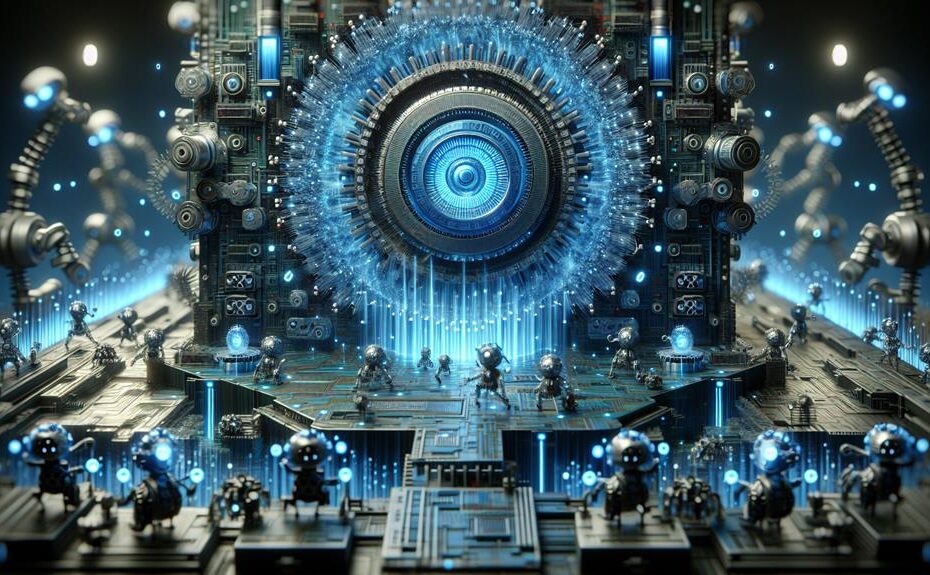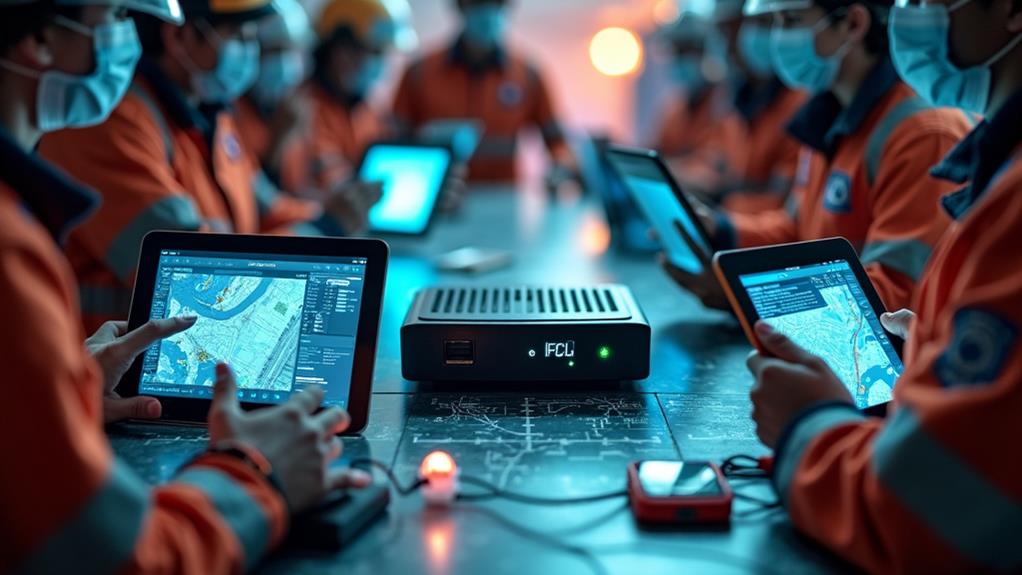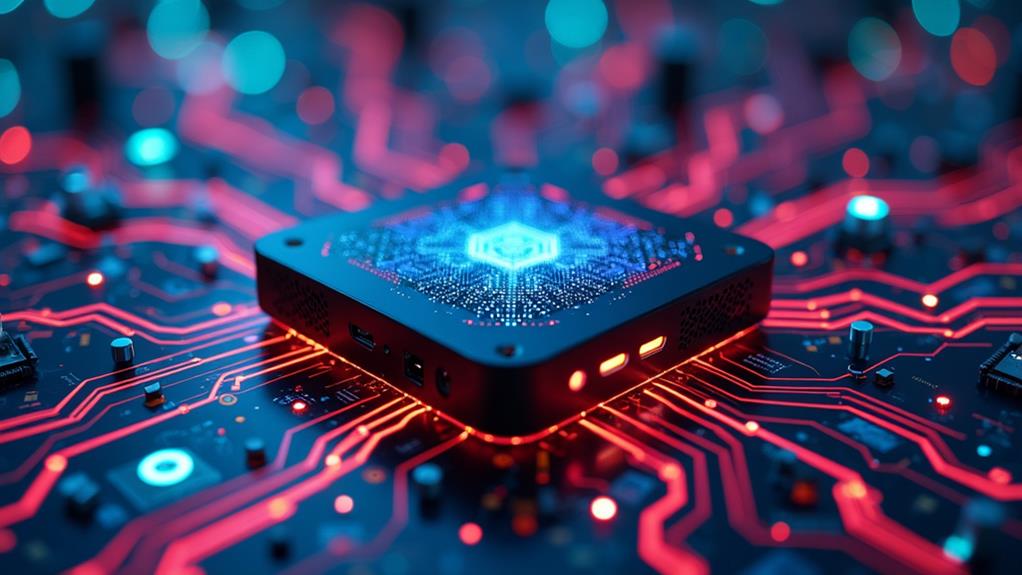



Imagine having tiny computers that can learn from data, make predictions, and automate processes like a human mind. Mini PCs equipped with AI capabilities are changing the way we approach machine learning by leveraging specialized hardware like CPUs, GPUs, and AI co-processors. As you dive deeper into the world of AI-powered mini PCs, you'll discover how these devices can adapt to new situations in real-time, transforming them into intelligent, dynamic platforms.
Key Takeaways
- Mini PCs Support AI: Mini PCs incorporate AI co-processors for recognition and decision-making.
- CPUs, GPUs, and AI Co-processors Are Optimized: CPUs, GPUs, and AI co-processors are optimized for AI computations.
- Sufficient RAM and Storage Are Needed: Mini PCs require at least 8GB RAM and 256GB SS
AI Systems and Traditional Computers
In the world of computing technology, AI systems and traditional computers differ in their approach to handling data and deriving results. Traditional computers are programmed to execute specific instructions with fixed outcomes, whereas AI-equipped computers can learn from data and adapt to new situations, enabling more advanced decision-making capabilities. This versatility allows AI systems to tackle machine learning tasks with greater precision and flexibility.
One of the primary reasons for this difference is the integration of AI co-processors, which empower computers to recognize patterns and make informed decisions without explicit programming. In contrast, traditional computers are limited to executing pre-determined instructions with fixed outputs, impeding their ability to handle complex machine learning tasks.
AI systems, on the other hand, boast the ability to learn from data and improve their performance over time. This capacity to adapt and grow makes them incredibly useful for tasks that require pattern recognition and analysis. As AI technology continues to evolve, it's likely to become even more integral in the performance of machine learning tasks and overall computer functionality.
What Is AI in Computers?
You see AI at work in computers when they learn from data, recognize patterns, and make informed decisions autonomously, mimicking human cognitive functions and vastly enhancing their ability to perform complex tasks. This AI-based learning enables computers to adapt to new situations and consistently improve their performance. Unlike traditional PCs, which execute specific programmed instructions, AI-powered PCs like mini PCs can harness the power of:
- Learning from Data: Mini PCs with AI can analyze and learn from large datasets, making them capable of predicting outcomes and automating processes.
- Pattern Recognition: AI algorithms empower mini PCs to identify and recognize patterns in data, making them adept at tasks requiring advanced analysis.
- Autonomous Decision-Making: AI integrates the ability to make informed decisions, allowing mini PCs to function independently and accurately.
- Real-Time Adaptation: By adapting to new data and situations in real-time, AI-powered mini PCs enhance overall efficiency and productivity.
In essence, AI transforms mini PCs into dynamic, intelligent devices that interact more effectively with their users and environment, revolutionizing the way we compute and interact with technology.
AI Applications and Uses
Through its integration into diverse industries, AI has opened new avenues for efficiency, accuracy, and decision-making across various sectors. AI is used extensively in healthcare to aid in medical diagnoses, drug discovery, and personalized treatment plans. In finance, AI algorithms predict market trends, manage risks, and automate trading, leading to enhanced decision-making and significant cost savings.赢
AI and Mini PC Technology
The proliferation of AI-powered mini PCs has vastly elevated the capabilities of compact computing, enabling seamless integration of machine learning applications within a diminutive yet potent computing package. These tiny machines can perform AI tasks at the edge, eliminating the need for latency-prone cloud connectivity and ensuring more secure data processing. You can easily integrate AI frameworks, libraries,
Key Features for AI Mini PCs
Effective AI mini PCs rely on the integration of advanced components tailored to handle intense computation and data handling, making them adept at processing and executing machine learning tasks without latency. To handle these complex tasks efficiently, your AI mini PC should meet specific system requirements.
Hardware and software configurations must be optimized to process extensive AI workloads effectively. CPUs, GPUs, and AI co-processors work in tandem to accelerate demanding computations. Sufficient RAM and storage are also indispensable for loading and processing large AI datasets and models. Compatibility with popular AI frameworks and software libraries ensures seamless deployment and smooth operation of machine learning models on these platforms.
In addition, thermal management is a pivotal aspect. Efficient cooling solutions are essential to maintain prime performance during sustained AI tasks. Secure connectivity options, including USB, Ethernet, HDMI, and wireless standards, facilitate seamless integration into AI and IoT ecosystems, enabling the exchange of data and insights. By considering these features, you can harness the power of AI mini PCs to drive innovation and efficiency in your applications.
RAM and Storage Requirements
When selecting a mini PC for AI applications, you need to ascertain it has the right amount of memory and storage to efficiently handle machine learning models and datasets. Focusing on the compact form factor, you should pay particular attention to the RAM and storage capacity.
- RAM Requirements: The mini PC should have at least 8GB of RAM, but 16GB or more is recommended for handling machine learning models efficiently.
- Storage Capacity: Aim for a minimum of 256GB SSD, but 500GB or 1TB SSD is preferred for storing large datasets and models. This validates that the system can quickly access and load extensive datasets.
- Fast Storage: Utilize M.2 NVMe SSDs for fast data access and model loading times.
- Expandable Storage: Opt for mini PCs with expandable storage options such as additional M.2 slots or HDD bays to scale up as data and model requirements grow.
Thermal Management Considerations
In order to keep pace with the rigorous computation demands of AI and machine learning, you need to prioritize thermal management to prevent overheating and performance degradation. Overheating can compromise the integrity of sensitive data processed by your AI applications, which makes it essential to incorporate robust cooling solutions into your mini PC design.
Passive cooling strategies, such as heatsinks alone, might not be sufficient for the intense processing required by AI. Active cooling methods like liquid cooling or high-performance air coolers can ensure consistent performance over time. Proper airflow and ventilation are also crucial to prevent temperature spikes. Effective thermal management unlocks the full potential of AI by maintaining processor efficiency while handling complex tasks. To maximize this potential, consider advanced cooling solutions that can adapt to the unique thermal demands of your machine learning workloads. Only by securing reliable and optimal thermal management can you truly harness the transformative power of AI to process sensitive data and drive innovation across diverse applications.
Selecting AI-compatible Software
When it comes to handling AI and machine learning tasks on your mini PC, the right software selections are vital. You need to select software tailored to maximize the full potential of your mini PC's AI capabilities, focusing on operating systems and tools that support popular frameworks and leverage hardware acceleration.
To make informed decisions for your AI setup, consider the following:
- Choose the Right Operating System: Ensure your OS supports popular machine learning frameworks like TensorFlow, PyTorch, and Keras for seamless integration and compatibility.
- Install Compatible Tools and IDEs: Select development tools like Jupyter Notebook, Visual Studio Code, or PyCharm to streamline your AI/ML workflow.
- Optimize with Libraries: Include optimization libraries like Intel's OpenVINO to accelerate hardware performance.
- Keep Software Up to Date: Stay current with the latest AI/ML libraries and updates to capitalize on performance enhancements and new features.
With these essential software selections, your mini PC is better equipped to handle AI and machine learning tasks efficiently.
Challenges and Limitations
Your mini PC, while powerful, faces specific challenges and limitations in handling AI and machine learning tasks. One significant constraint is the power and thermal constraints of mini-PCs, which can limit their ability to handle computationally intensive AI workloads for extended periods. Additionally, memory and storage capacity limitations may restrict your mini PC's ability to load and process large AI datasets and models.
Compared to larger, more powerful systems, performance trade-offs can impact the efficiency and speed of AI inference and training on mini-PCs. Furthermore, compatibility issues with certain machine learning libraries or pre-trained models may arise due to the compact nature of mini-PC hardware. This could lead to difficulties when running certain AI models, and you may need to explore alternatives such as cloud-based AI services for more resource-demanding tasks.
To overcome these limitations, it is essential to utilize strategies like optimizing model deployment and leveraging cloud resources when necessary. Examining these factors will help you maximize the potential of your mini PC for AI and machine learning tasks, ensuring you can extract the most from this compact yet versatile platform.
Frequently Asked Questions
Do You Need a Powerful PC for Ai?
For AI tasks, you don't necessarily need a high-performance PC; a low-end processor can suffice for simple workloads or cloud-based processing. Dedicated AI hardware like GPUs or specialized chips can also substantially optimize performance.
Is 16GB RAM Enough for Machine Learning?
For machine learning tasks, 16GB RAM is the bare minimum. However, depending on your performance requirements, you'll need more RAM for larger models, massive datasets, and ideal storage optimization and thermal management to avoid bottlenecks.
What Is the Difference Between AI PC and Normal Pc?
You'll notice an AI PC differs from a normal PC mainly in its hardware requirements and software needs, leading to significant performance comparisons.
Which Laptop Is Best for AI and Machine Learning?
When diving into AI and machine learning, look for specialized laptops with high-performance CPUs like Intel Core i9-13980HX, NVIDIA GeForce RTX 4070 GPUs, and ample, upgradable DDR5 RAM.
Conclusion
Miniscale computing marvels now wield the power to chat like sages, wield graphics like wizards, and prune data like skillful gardeners. AI powerhouse mini PCs can these intelligent giants conquer it all? Equipped with specialized hardware, they can run autonomous, predict the future, and make decisions by pattern recognition. But beware, their collective might is bound by the chains of power, thermal control, memory, and storage – the four horsemen of computational limitation.
Disclosure: As an Amazon Associate, I earn from qualifying purchases.






